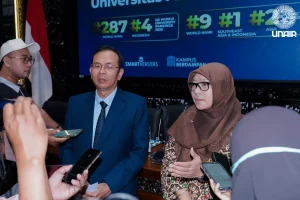UNAIR NEWS – President Prabowo’s free nutritious meal program (MBG) has gained public attention for its positive impact. However, reports that part of the initiative in Kendari is being funded from the president’s personal resources have prompted critical analysis from Universitas Airlangga (UNAIR) legal expert Dr. M. Syaiful Aris.
Well-intentioned effort but legally flawed
Dr. Aris, a lecturer at UNAIR’s Faculty of Law, praised the initiative for aligning with the president’s campaign promises by providing free meals, especially to students. Nonetheless, he expressed concerns about the legality of using personal funds for a government program.
“State expenditures should be funded through the state treasury, as mandated by Article 1, Paragraph (10) of Law No. 17 of 2003 on State Finance. While the practice doesn’t directly harm state finances, it undermines the principles of orderly and lawful financial management,” he explained.

Potential for legal violations and conflicts of interest
Dr. Aris noted that relying on personal funds in a public program could contravene financial governance principles outlined in Article 3 of Law No. 17/2003, which require efficient, transparent, and accountable state financial management.
He also warned of potential conflicts of interest. “This action risks creating a conflict of interest. When a public official uses personal funds in a public program, it may be perceived as an attempt to manipulate public opinion or build political capital. Ideally, such risks should be mitigated early to prevent abuse of authority in the future,” he stated.
Impact on bureaucratic accountability
The expert further explained that this practice could disrupt the bureaucratic balance. As outlined in Article 7 of Law No. 17/2003, governmental operations should be funded through the state budget (APBN), which requires approval by the House of Representatives (DPR). This system of checks and balances ensures accountability and prevents misuse of funds.
Dr. Aris emphasized the importance of fully funding the MBG program through the APBN in a transparent and accountable manner. Such a move, he argued, would not only avoid potential legal issues but also strengthen public trust in the government.
“This program is highly beneficial and deserves widespread public support. However, its implementation must comply with existing laws and incorporate stringent oversight mechanisms to avoid financial mismanagement,” he concluded.
Author: Sintya Alfafa
Editor: Khefti Al Mawalia









